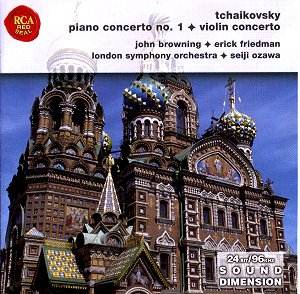This is a well-loved pair of works separated by only
three years from a composer then in his dazzling thirties. You would
be lucky to find them in a single concert given the featuring of two
soloists. On disc the coupling is not at all unusual.
These two readings from U.S.-born soloists have been
yoked together before - possibly in the RCA Navigator series and before
that on LP. Ozawa delivers explosive if delightfully unsubtle dynamism
as if resolved to be noticed (listen to him in the thunderous repeated
tutti in the first movement of the violin concerto at 8.57). Friedman
is as forwardly urgent and incendiary as Ozawa who is equally good at
the pastel painting of the slow movements. As impressive for vitesse
as for muscle - excitement is never in short supply from Friedman; nothing
is gabbled nor are details scouted. Friedman was a Heifetz pupil who
performed Bach’s Double Concerto in 1960 in London with his teacher.
This recording seems to have been one of his comparatively few recordings
before a road accident in the mid-1980s confined his career to teaching.
He stands closer in his accessible generous response to the poetry and
plenitude of tone of David Oistrakh, Leonid Kogan and even Kulenkampf
than to the chromium gleam of his master. Of course, on a good day (such
as his recording of the Elgar with Sargent) Heifetz can be incomparable
but there were many recording days when he leaves me unmoved. Friedman’s
note production is steadier than Francescatti (whose quickish vibrato
can annoy some) and certainly than Sarbu or Belkin. I would love to
have heard Friedman in the Sibelius at one extreme and the Saint-Saëns
Havanaise at the other.
The Piano Concerto is launched with the same beefy
presence you encounter in Rozhdestvensky’s Decca-Universal version with
his wife Viktoria Postnikova. The horns of the LSO (to be relished in
soloistic repose in the Violin Concerto) here exercise a belligerent
grip. The orchestral web is more congested than in the Violin Concerto.
The piano sound carries a hint of gauzy warmth and muffling drapes.
Browning’s delicacy, celerity and fantasy are best displayed in the
middle movement in which there is some truly lovely playing. Sad to
note his death earlier this year (2003). John Browning was better known
for his never CD-transferred Prokofiev concerto cycle and, of course,
for his classic Barber (CBS-Sony).
Recording quality is admirable: sable, smooth, a tad
raw perhaps but really pretty good though less so for the Piano Concerto.
Some wise choices have been made by Andreas Torkler in the remastering
process conducted at Sonopress’s Gütersloh studio. Friedman’s is
a good version jostling shoulders with Kogan (EMI, Silvestri), Oistrakh
(BMG-Melodiya), Vladimir Spivakov (various Slovakian labels). Browning
is less good when up against Postnikova, Weissenberg or Gilels.
This is at bargain price so if you are starting out
on a Tchaikovsky journey and want to make it a passionate pilgrimage
you can be assured of real enjoyment from this disc.
Rob Barnett

